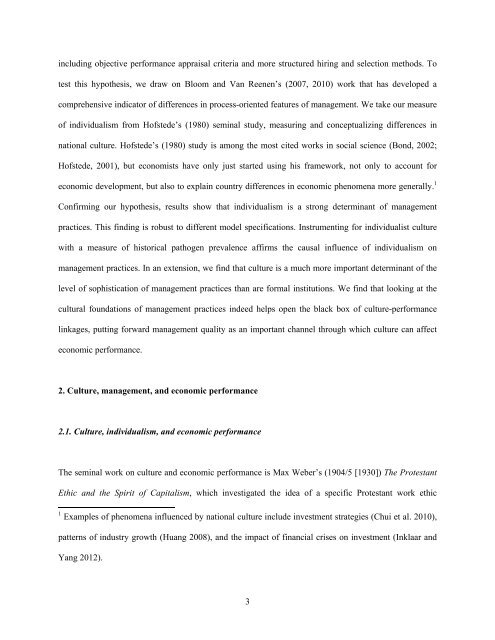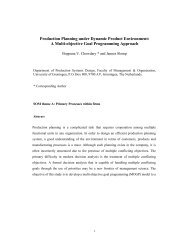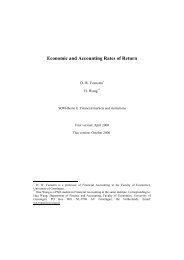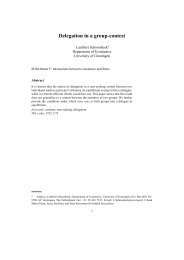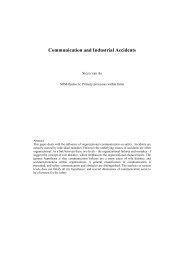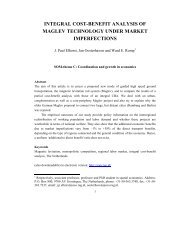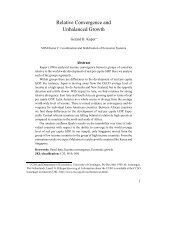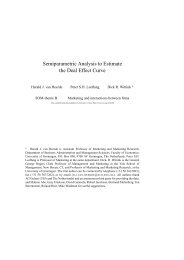Individualism and the cultural roots of management practices
Individualism and the cultural roots of management practices
Individualism and the cultural roots of management practices
You also want an ePaper? Increase the reach of your titles
YUMPU automatically turns print PDFs into web optimized ePapers that Google loves.
including objective performance appraisal criteria <strong>and</strong> more structured hiring <strong>and</strong> selection methods. To<br />
test this hypo<strong>the</strong>sis, we draw on Bloom <strong>and</strong> Van Reenen’s (2007, 2010) work that has developed a<br />
comprehensive indicator <strong>of</strong> differences in process-oriented features <strong>of</strong> <strong>management</strong>. We take our measure<br />
<strong>of</strong> individualism from H<strong>of</strong>stede’s (1980) seminal study, measuring <strong>and</strong> conceptualizing differences in<br />
national culture. H<strong>of</strong>stede’s (1980) study is among <strong>the</strong> most cited works in social science (Bond, 2002;<br />
H<strong>of</strong>stede, 2001), but economists have only just started using his framework, not only to account for<br />
economic development, but also to explain country differences in economic phenomena more generally. 1<br />
Confirming our hypo<strong>the</strong>sis, results show that individualism is a strong determinant <strong>of</strong> <strong>management</strong><br />
<strong>practices</strong>. This finding is robust to different model specifications. Instrumenting for individualist culture<br />
with a measure <strong>of</strong> historical pathogen prevalence affirms <strong>the</strong> causal influence <strong>of</strong> individualism on<br />
<strong>management</strong> <strong>practices</strong>. In an extension, we find that culture is a much more important determinant <strong>of</strong> <strong>the</strong><br />
level <strong>of</strong> sophistication <strong>of</strong> <strong>management</strong> <strong>practices</strong> than are formal institutions. We find that looking at <strong>the</strong><br />
<strong>cultural</strong> foundations <strong>of</strong> <strong>management</strong> <strong>practices</strong> indeed helps open <strong>the</strong> black box <strong>of</strong> culture-performance<br />
linkages, putting forward <strong>management</strong> quality as an important channel through which culture can affect<br />
economic performance.<br />
2. Culture, <strong>management</strong>, <strong>and</strong> economic performance<br />
2.1. Culture, individualism, <strong>and</strong> economic performance<br />
The seminal work on culture <strong>and</strong> economic performance is Max Weber’s (1904/5 [1930]) The Protestant<br />
Ethic <strong>and</strong> <strong>the</strong> Spirit <strong>of</strong> Capitalism, which investigated <strong>the</strong> idea <strong>of</strong> a specific Protestant work ethic<br />
1 Examples <strong>of</strong> phenomena influenced by national culture include investment strategies (Chui et al. 2010),<br />
patterns <strong>of</strong> industry growth (Huang 2008), <strong>and</strong> <strong>the</strong> impact <strong>of</strong> financial crises on investment (Inklaar <strong>and</strong><br />
Yang 2012).<br />
3


